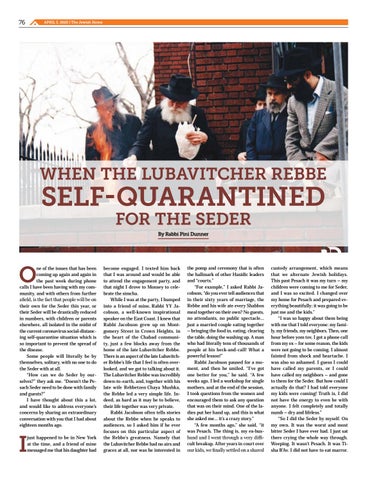76 88
APRIL 3, 2020 | The|Jewish Home OCTOBER 29, 2015 The Jewish Home
WHEN THE LUBAVITCHER REBBE
SELF-QUARANTINED FOR THE SEDER By Rabbi Pini Dunner
O
ne of the issues that has been coming up again and again in the past week during phone calls I have been having with my community, and with others from further afield, is the fact that people will be on their own for the Seder this year, or their Seder will be drastically reduced in numbers, with children or parents elsewhere, all isolated in the midst of the current coronavirus social-distancing self-quarantine situation which is so important to prevent the spread of the disease. Some people will literally be by themselves, solitary, with no one to do the Seder with at all. “How can we do Seder by ourselves?” they ask me. “Doesn’t the Pesach Seder need to be done with family and guests?” I have thought about this a lot, and would like to address everyone’s concerns by sharing an extraordinary conversation with you that I had about eighteen months ago.
I
just happened to be in New York at the time, and a friend of mine messaged me that his daughter had
become engaged. I texted him back that I was around and would be able to attend the engagement party, and that night I drove to Monsey to celebrate the simcha. While I was at the party, I bumped into a friend of mine, Rabbi YY Jacobson, a well-known inspirational speaker on the East Coast. I knew that Rabbi Jacobson grew up on Montgomery Street in Crown Heights, in the heart of the Chabad community, just a few blocks away from the home of the late Lubavitcher Rebbe. There is an aspect of the late Lubavitcher Rebbe’s life that I feel is often overlooked, and we got to talking about it. The Lubavitcher Rebbe was incredibly down-to-earth, and, together with his late wife Rebbetzen Chaya Mushka, the Rebbe led a very simple life. Indeed, as hard as it may be to believe, their life together was very private. Rabbi Jacobson often tells stories about the Rebbe when he speaks to audiences, so I asked him if he ever focuses on this particular aspect of the Rebbe’s greatness. Namely that the Lubavitcher Rebbe had no airs and graces at all, nor was he interested in
the pomp and ceremony that is often the hallmark of other Hasidic leaders and “courts.” “For example,” I asked Rabbi Jacobson, “do you ever tell audiences that in their sixty years of marriage, the Rebbe and his wife ate every Shabbos meal together on their own? No guests, no attendants, no public spectacle… just a married couple eating together – bringing the food in, eating, clearing the table, doing the washing up. A man who had literally tens of thousands of people at his beck-and-call! What a powerful lesson!” Rabbi Jacobson paused for a moment, and then he smiled. “I’ve got one better for you,” he said. “A few weeks ago, I led a workshop for single mothers, and at the end of the session, I took questions from the women and encouraged them to ask any question that was on their mind. One of the ladies put her hand up, and this is what she asked me… it’s a crazy story.” “A few months ago,” she said, “it was Pesach. The thing is, my ex-husband and I went through a very difficult breakup. After years in court over our kids, we finally settled on a shared
custody arrangement, which means that we alternate Jewish holidays. This past Pesach it was my turn – my children were coming to me for Seder, and I was so excited. I changed over my home for Pesach and prepared everything beautifully; it was going to be just me and the kids.” “I was so happy about them being with me that I told everyone: my family, my friends, my neighbors. Then, one hour before yom tov, I got a phone call from my ex – for some reason, the kids were not going to be coming. I almost fainted from shock and heartache. I was also so ashamed. I guess I could have called my parents, or I could have called my neighbors – and gone to them for the Seder. But how could I actually do that? I had told everyone my kids were coming! Truth is, I did not have the energy to even be with anyone. I felt completely and totally numb – dry and lifeless.” “So I did the Seder by myself. On my own. It was the worst and most bitter Seder I have ever had. I just sat there crying the whole way through. Weeping. It wasn’t Pesach. It was Tisha B’Av. I did not have to eat marror.





















